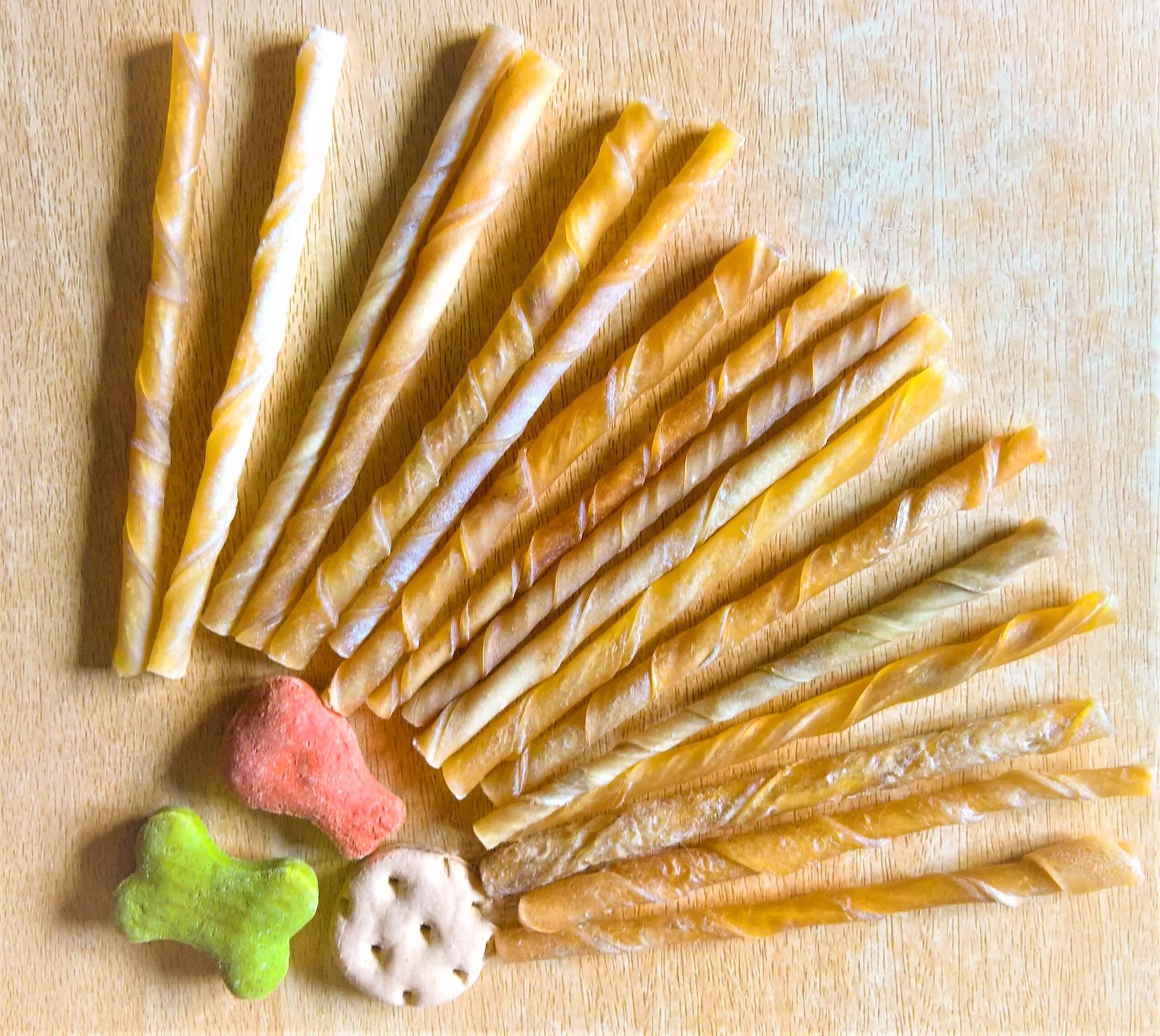Not sure what or how to feed your Welsh Corgi? Too many foods on the market, too many treats and not enough information can make it all confusing. In this guide to the best diet for corgis, we’ll explore ALL you need to know about the type of nutrition your dog needs for a long and healthy live.

AUTHOR
Editorial Team
CATEGORY
Diet & Nutrition
POSTED ON
2 November 2024
What is the best diet for a corgi?
Every dog out there is unique and yours is no exception. That’s why the best diet for your corgi is also unique and specific, aka appropriate for its age, size, health, metabolism, energy needs and activity levels.
With so many different types of dog foods and treats on the market, however, it can be challenging to figure out what is the best food for your pet. That’s why we compiled this in-depth guide that will help you to find out what, how much and when to feed your corgi to ensure its optimal health, wellbeing and longevity.
What should a Corgi diet contain?
Good nutrition is an essential part of raising a healthy, energetic and happy dog. That’s why it’s important to know how to provide your corgi with food that’s both nutritious, wholesome and tasty. Daily meals must contain a well-balanced combination of nutrients appropriate for canines. What does that mean though?
First off, let’s make an important note on what type of food canines need.
Your dog’s digestive tract has not changed much since the ancient times when your furball was a wild, undomesticated wolf. That’s why the most natural food for a dog is fresh and consisting mainly of meat, bones and offal. Which is why a daily diet should contain a combination of protein, fats, vitamins, minerals, and a little fibre (in the form of vegetables and berries).
Let’s take a closer look at the types of macro- and micronutrients your dog needs, and the most suitable sources for them.
1. Protein
It might be hard to acknowledge that your cute fluffball is descended from a wolf, but that’s a fact, and one that determines your corgi’s diet. Protein is a vital nutrient for canines that ensures all systems and functions work well, and it does that by:
• Supplying your dog with energy
• Supporting muscle growth and repair
• Growing new skin, hair, nails, and other tissues
• Maintaining a healthy immune system
• Producing hormones, enzymes, and antibodies
To put it plainly, corgis need a lot of protein. Ideally, that protein should come in the form of animal-based products, such as chicken, turkey, beef, lamb, duck, eggs or even fish and seafood.
2. Fat
Fat is the second most important nutrient in a dog’s diet because it provides energy. An optimal diet should contain a mix of saturated fats and unsaturated fats derived from animal sources.
Saturated fats can help your dog’s body to absorb fat-soluble vitamins A, D, E and K. Unsaturated fats, such as Omega-3 and Omega-6+9 ensure your corgi has a healthy coat, skin, eyes, heart and kidneys. In addition to all this, fats can maintain a healthy nervous system, balance hormones, enhance the brain function and learning, and reduce inflammation.
3. Carbs
As carnivores, dogs don’t handle most carbs well. Their stomach cannot digest and ferment carbs fully and if you feed them kibble that is rich in starchy carbs, such as potatoes, rice or legumes, this can increase their insulin, glucagon and cortisol levels, which can negatively impact their pancreas and digestion.
Having said this, it’s good to know that dogs can eat small amount of certain carbs derived from vegetables, some whole grains, fruits and some herbs. These types of foods can supply your Corgi with fibre, which improve digestion, and antioxidants they cannot get from meat sources. Furthermore, these types of carbs will give you dog energy.
4. Vitamins and Minerals
Just as us, corgis need vitamins and minerals, which support their skin, bones and vital body functions. Corgis get their supply of vitamins and minerals from meat, offal, bones and plants. Try to incorporate offal and bones into the diet of your little domesticated wolf. If you don’t see these ingredients in your corgi’s commercial food, you can give her recreational bones to chew on.
5. Water
Just like the human body, a corgi’s organism is made up of approximately 70% water. That’s why, water is a vital nutrient for all cells, systems and functions. Water helps regulate a corgi’s body temperature and flushes toxins away. It helps with digestion, the functioning of all organs and the absorption of nutrients.
Make sure your corgi has access to fresh, clean water 24/7.
Dogs can get dehydrated very easily, particularly in hot weather or after intense exercise. And dehydration can cause serious health issues, including heat stroke.
Keep an eye on your corgi’s water consumption, and if you see any changes in drinking habits, call your vet; sometimes odd changes in water consumption can indicate an underlying health problem.
What Types of Food Can You Feed Your Corgi
Now that you know what types of nutrients a corgi needs, let’s look at the different types of foods.
Corgis can be fed three main types of food: dry, wet or raw.
Whichever you choose, keep in mind that the main ingredient in all three must be meat, be it beef, chicken or something else. Look for high-quality products that list animal proteins as the primary component. Make sure the food contains a wide variety of vitamins and minerals as well. Avoid labels that contain fillers, artificial chemicals, and preservatives.
Commercial foods can be specifically formulated for dogs with different needs and health conditions, from puppies to seniors, and from obese to diabetic dogs. When choosing a brand and variety, take your dog’s health, weight and age into consideration.
Dry Food
If you go for a dry food diet, avoid kibble that lists grains or wheat as the main ingredient and look for brands that list meat as the main component.
Wet Food
Wet food can have both pros and cons for the digestive tract. It can be good for dogs who get constipated; however, it might also cause diarrhoea in pups or adult dogs with a more sensitive stomach. If the latter happens, you can feed your dog a combination of dry kibble and wet food.
Raw Food
A raw food diet mimics what your corgi would eat in the wild. However, it’s very important to stick to human standards for food safety. You can prepare, freeze and thaw meat at home, or you can buy raw food mixes. The raw food must contain more meat over any other ingredient, however, it’s good to add a little veg (we will cover what vegetables your dog can eat later).
Portion Sizes and Feeding Schedule
Following the instructions and guidelines on dog food packaging is a good starting point when determining portion size and feeding frequency. However, keep in mind that your dog is unique, and its calorie intake should be determined by its age, activity levels and overall health. Talk to your vet if you’re not sure how much food to give your furball.
How many times should you feed your corgi?
As a rule of thumb, it’s best to divide the daily food between two-to-three separate meals. This will ensure that your corgi maintains its energy throughout the day.
How much should you feed your corgi?
Some experts suggest the following guideline for feeding your dog dry or wet food. Based on your dog’s weight, you can give it the corresponding amount of food per day:
Dog Weight — Food Amount in Cups
5 lbs (2.2 kg) — ½ or ¾ of a cup
10 lbs (4.5 kg) — ¾ up to 1 cup
20 lbs (9 kg) — 1 ¼ to 1 ¾ of a cup
40 lbs (18 kg) — 2 to 3 cups
60 lbs (27 kg) — 3 ½ cups
80 lbs (36 kg) — 4 cups
100 lbs (45 kg) — 4 ½ cups
Since the number of calories varies from one formulation to another, always consult the charts on the packaging of your dog food.
Healthy Treats and Snacks
Treats are an indispensable training tool that can be used as an incentive to teach your corgi proper behaviour. You can buy commercially produced treats or use certain foods that are safe for dogs. These include meats and certain types of fruit and veg, such as:
• Oatmeal • Yogurt • Apples (with the seeds removed) • Cheese • Bananas • Meat jerky • Cooked meat • Berries • Melons • Peas • Squash • Pumpkin • Carrots • Boiled eggs • Salmon or other fish

Snacks for a Welsh Corgi
Attention: Foods That are Toxic to Corgis!
As you can see from the list above, while some human foods are perfectly safe for dogs, others can be downright dangerous and even highly toxic. Raw eggs for example can give your corgi salmonella poisoning. You can find a detailed list of foods that are toxic to dogs here along with information about the symptoms and risks.
How and when should you feed your corgi?
Consistent mealtimes are extremely important for corgis, both young and old. Dogs are creatures of habit who thrive on routine when it comes to everything, including food. Furthermore, scheduled eating can help your dog, especially when it’s young, to avoid accidents after nightfall.
How much you feed your corgi depends on several factors, including:
• Your corgi’s metabolism
• The quality and type of food
• Your corgi’s weight
• Your corgi’s age
• The amount of exercise your corgi gets
• Whether your corgi needs to gain, maintain or lose weight
Puppy Feeding
Puppies have very different dietary requirements from adult corgis. Here are the most important things to keep in mind about your pup’s diet:
1. Do not wean your puppy from its mom until it’s at least eight weeks old. During those first crucial weeks of its life, the mother’s milk will supply all the nutrients it needs for its proper development.
2. You can start giving your puppy thick food after eight weeks. Until it turns 12 months, it should be fed specifically formulated food for puppies. If you decide to feed your pup kibble, soak the kibble in water, so it can digest it more easily.
3. Establish a consistent feeding routine. Feed your puppy too close to bedtime, and it might need to go potty and make a mess indoors while you are asleep. Split your pup’s food into several rations and feed him 3 to 4 times per day, preferably at regular times, until it’s at least six months old.

How to Feed a Little Corgi Puppy
Adult Corgi Feeding
Transition your corgi’s diet to adult food gradually and make sure to talk to your vet about the best timing and best practices. You can start feeding your corgi twice a day as you make the switch to adult dog food. Always make sure the amount of food and nutrients match your dog’s weight and energy requirements.
Maintain a consistent routine because that’s best for your corgi’s mental well-being and sense of calm, not just for his digestive tract or his energy levels. One meal in the morning and one at the end of the day is the ideal routine for most dogs.
Setting Down the Feeding Rules
As a dog owner you must assert yourself as the alpha dog in the pack. This means that your corgi will have to learn early on to respect your own mealtimes, and to never beg while you are eating.
To achieve this, start training your corgi obedience while she’s still a puppy. It’s also crucial to avoid teaching her bad habits. If you are having a meal, your corgi must go to her crate, instead of sitting by your side begging. You can discourage this behaviour by making sure to never offer leftovers from your own meals. We have already discussed how certain foods can be bad or even toxic for your dog, so offering her leftovers can pose many risks.
A dog’s digestive system is very different from ours. That’s why you should train your corgi to stick to a feeding schedule. If she follows a healthy feeding routine you will minimize the chance of her developing health problems or gaining weight.
Feeding More Than One Pet
If you have more than one dog or even different species of pets, it’s best to minimize mealtime conflict. To do this, make sure each of your pets has their own, individual food and water bows. Also, if one of your pets has a specific diet, your other pets must not have access to their food. This way everyone can consume the proper nutrients they need.
Some dogs may get apprehensive or possessive of their food, and that can show as aggression. Other dogs might start wolfing down their food, if they feel competition from other dogs in the household. You don’t want to overfeed your corgi, so even if he gobbles down his food, don’t give it all in one go. Split his daily ration into at least two portions and feed him at set times.
Weight Management
There’s some bad news for you as a new corgi owner – corgis are prone to obesity. Corgis are natural herders, born to run through pastures and farm grounds all day long. Lock them into an apartment or a house and they are at a risk of turning into overweight couch potatoes.
Sadly, obese corgis are more prone to joint problems and other health concerns, that’s why, in addition to exercising them regularly, it’s critical to prevent overfeeding.
Not sure whether your corgi’s weight is healthy? Feel her rib cage. If you cannot feel the ribs at all, she has probably gained too much weight. Of course, it’s also important to get regular checkups with the vet to hear their expert opinion too.
If your munchkin puts on too much weight, cut back on food, opt for a fat-free diet and start giving her a little extra exercise. Keep track of your corgi’s weight and body condition regularly, and you will have a healthy Welsh Corgi.
Dietary Concerns and Allergies
The Welsh corgi is just as susceptible to developing food allergies and intolerances, as any other dog out there. Unfortunately, the list of foods that a corgi can get allergic to is quite long. These include:
1. Proteins: beef, chicken, lamb, pork, fish or eggs.
2. Grains: wheat, corn, or soy.
3. Dairy Products: milk, cheese, or other dairy products.
4. Food Additives: preservatives, artificial colours, and flavours.
5. Legumes: legumes, such as peas and lentils.
How would you know whether your corgi is having a food allergy? If you notice that your corgi has developed digestive problems (vomiting or diarrhoea), irritated skin, ear infections, chronic licking or paw chewing, you might be onto something. Take your corgi to the vet, so they can run tests and propose an elimination diet to find out the culprit.
Now that you know all the essential information about feeding your corgi, you are better prepared to ensure that he gets a balanced, healthy diet.
Check out some of our other articles that will help you learn all about your corgi, its diet, health and training, among other topics.






